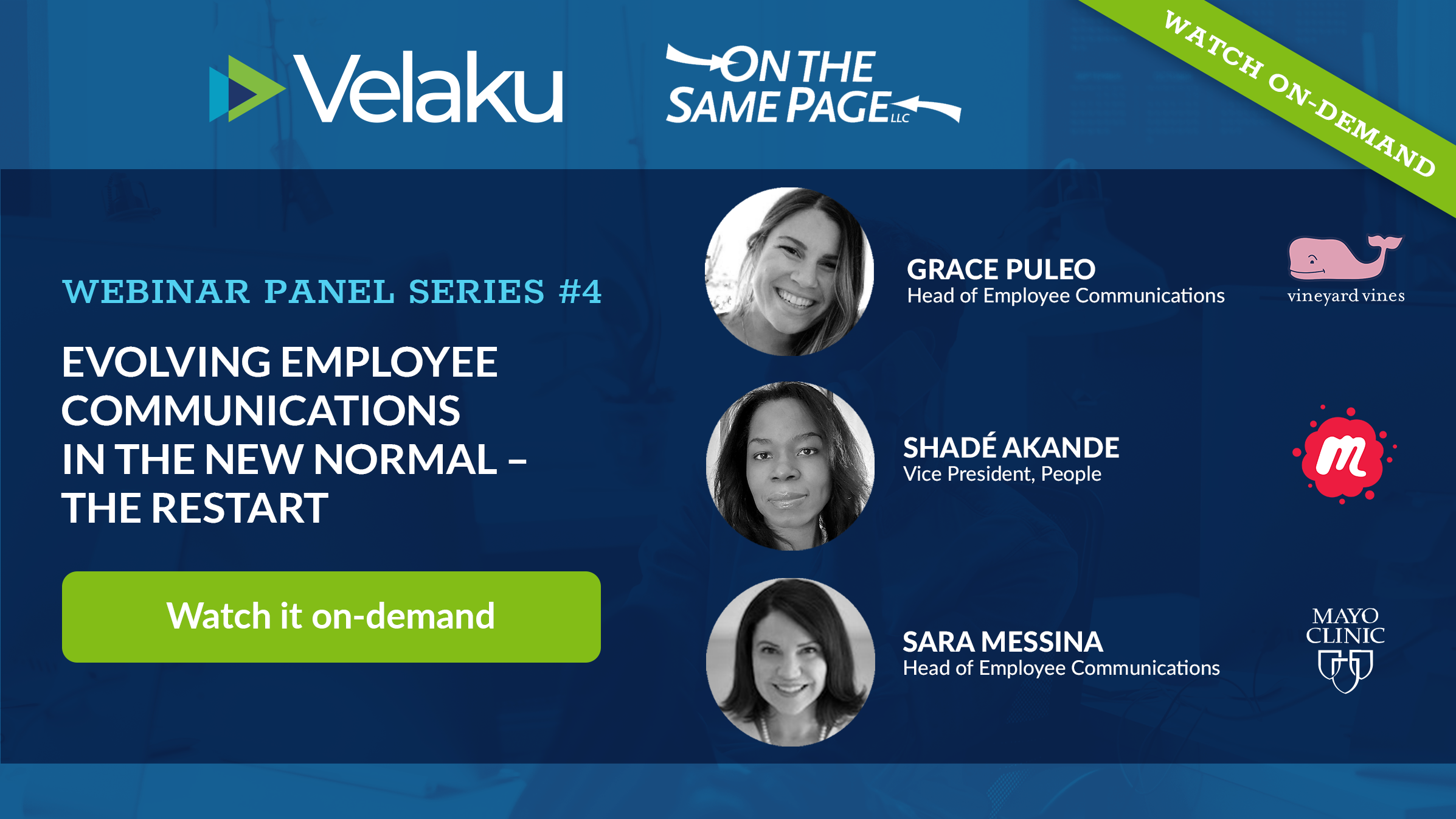As employee communications teams evolve the conversation past the crisis to the “next normal”, they are leaning on the foundation of their company’s culture to help drive decision making across a host of topics and areas of the business. As Sara Messina, Head of Staff Engagement Communications at Mayo Clinic said in a recent webinar, “This is the fun part! Communicators get to engineer a future state for the way we work that is agile and focused and will lead to higher engagement. We can be intentional, keeping the good things and shed the legacy practices that aren’t serving us well any more.”
Along with Grace Puleo from Vineyard Vines and Shade Akady from MeetUp, Sara joined us for the fourth episode of our popular webinar series on Employee Communications in the COVID era - co-hosted by Velaku Software and the consulting firm On The Same Page. In this episode these three executives shared the important role that company culture and core values play as a driving force in key decision making.
Decisions Driven by Company Culture and Core Values
The Mayo Clinic always strives to contextualize their employee communications and decisions as being driven by their core values - that the needs of the patient must come first. “This core message guides us and our purpose and resonates with our staff.” says Sara.
One example is the new company travel policy that went into effect for COVID, which prohibited non-essential staff travel. At first it might seem contradictory - that patients are encouraged to travel to Mayo Clinic, but the staff has been asked not to travel. However, as Sara explained, “taken in the context of the core value that the patient’s needs come first, it makes sense. We need the staff to forgo non-essential travel, so that the patients can travel to a safe place to get world-class care.”
Family First
Mayo Clinic was not the only company that put their core values first. Vineyard Vines, the well known apparel and retailer that is also very much a family-owned business, continued to pay retail employees - rather than furlough them - when all their retail stores were closed across the country for six weeks. “Together we have shared so many Every Day Should Feel This Good moments and, in times like this, we know that the strength and character of our communities will see us through," said Shep & Ian Murray, Vineyard Vines, Co-Founders and brothers in their press release. They were one of the few retail companies in the country not to furlough their employees.
Seize the Opportunity
To take it one step further, during the time when their employees were not able to work in the shuttered stores, Vineyard Vines took advantage of this time by assigning many of the retail team to various projects they would otherwise not get involved in.
For example, store managers worked in the call centers to help keep up with the very high call volumes. With a core value of ‘family first,’ this temporary reallocation of staff not only gave the retail employees exposure to other areas of the business, but leveraged the company culture of everyone supporting the family business.
As employee communicators move into the “next normal”, and start to make changes to, and communicate, many HR and operational policies and processes, putting the company culture front and center ensures that employee communications will continue to effectively drive employee engagement.
These insights come from the fourth episode of our popular webinar series, co-hosted by Velaku Software and the consulting firm On The Same Page. The webinar featured three senior communicators, Grace Puleo, Head of Internal Communications at Vineyard Vines, Shade Akady, VP, People at MeetUp, and Sara Messina, Head of Staff Engagement Communications at Mayo Clinic. Over the course of an hour each one passed on practical insights for both communications and human resources professionals.





